COMPLETE GUIDE TO
PRESCRIPTION &
NONPRESCRIPTION DRUGS By H. WINTER GRIFFITH, M.D. Revised and Updated by Stephen W. Moore, M.D. Technical Consultants:
Kevin Boesen, Pharm.D.
Cindy Boesen, Pharm.D. Over 6000 Brand Names Over 1000 Generic Names A Perigee Book
A PERIGEE BOOKPublished by the Penguin GroupPenguin Group (USA) Inc.375 Hudson Street, NewYork, NewYork 10014, USA
USA | Canada | UK | Ireland | Australia | New Zealand | India | South Africa | China Penguin Books Ltd., Registered Offices: 80 Strand, London WC2R 0RL, England For more information about the Penguin Group, visit penguin.com.
COMPLETE GUIDE TO PRESCRIPTION AND NONPRESCRIPTION DRUGS Copyright 1983, 1985, 1987, 1988, 19902013 by Penguin Group (USA) Inc. All rights reserved. No part of this book may be reproduced, scanned, or distributed in any printed or electronic form without permission. Please do not participate in or encourage piracy of copyrighted materials in violation of the authors rights. Purchase only authorized editions. PERIGEE is a registered trademark of Penguin Group (USA) Inc.
The P design is a trademark belonging to Penguin Group (USA) Inc. PUBLISHING HISTORY 2014 Perigee trade paperback edition / November 2013 ISBN: 978-1-101-63145-4 ISSN: 1082-2585 Neither the publisher nor the author is engaged in rendering professional advice or services to the individual reader. The ideas, procedures, and suggestions contained in this book are not intended as a substitute for consulting with your physician. All matters regarding your health require medical supervision. Neither the author nor the publisher shall be liable or responsible for any loss or damage allegedly arising from any information or suggestion in this book. While the author has made every effort to provide accurate telephone numbers, Internet addresses, and other contact information at the time of publication, neither the publisher nor the author assumes any responsibility for errors, or for changes that occur after publication.
Further, the publisher does not have any control over and does not assume any responsibility for author or third-party websites or their content. Most Perigee books are available at special quantity discounts for bulk purchases for sales promotions, premiums, fund-raising, or educational use. Special books, or book excerpts, can also be created to fit specific needs. For details, write: Special.Markets@us.penguingroup.com. 
A BOUT THE A UTHOR
H. Winter Griffith, M.D., authored 25 medical books, including the
Complete Guide to Symptoms, Illness & Surgery and
Complete Guide to Sports Injuries, each published by The Body Press/Perigee Books.
Others include Instructions for Patients; Drug Information for Patients; Instructions for Dental Patients; Information and Instructions for Pediatric Patients; Vitamins, Minerals and Supplements; and Complete Guide to Medical Tests. Dr. Griffith received his medical degree from Emory University in Atlanta, Georgia. After 20 years in private practice, he established and was the first director of a basic medical science program at Florida State University. He then became an associate professor of Family and Community Medicine at the University of Arizona College of Medicine. Until his death in 1993, Dr.
Griffith lived in Tucson, Arizona. EditorStephen Moore, M.D. Family physician, Tucson, Arizona Technical ConsultantsKevin Boesen, Pharm.D. Clinical Assistant Professor, College of Pharmacy, University of Arizona Cindy Boesen, Pharm.D. Clinical Instructor, College of Pharmacy, University of Arizona Technical EditorJo A. Griffith
Drugs and You
What is in This Book The purpose of this book is to give you information about the most widely used drugs (prescription and nonprescription). The information is derived from many authoritative sources and represents the consensus of many experts. Every effort has been made to ensure accuracy and completeness. However, because drug information is constantly changing, you should always talk to your doctor or pharmacist if you have any questions or concerns.
The information applies to generic drugs in both the United States and Canada. Generic names do not vary in these countries, but brand names do. Each year, new drug charts are added and existing charts are updated when appropriate. For the most part, drugs that are injected by a medical professional, used mainly in a hospital (or medical clinic) or have rare usage are not included. A drug cannot cure. It aids the bodys natural defenses to promote recovery.
Likewise, a manufacturer or doctor cannot guarantee a drug will help every person. The complexity of the human body, individual responses in different people and in the same person under different circumstances, past and present health, age and gender impact how well a drug works. All effective drugs produce desirable changes in the body, but can also cause undesirable adverse reactions or side effects. Before you decide whether to take a drug, you or your doctor must decide, Will the benefits outweigh the risks? In the United States, it is the responsibility of the Food and Drug Administration (FDA) to ensure that drugs are safe and effective. For more information, you may contact the FDA at 1-888-INFO-FDA or visit the website: www.fda.gov. Your Role Learn the generic names and brand names of all your medicines.
For example, acetaminophen is the generic name for the brand Tylenol. Write them down to help you remember. If a drug is a combination, learn the names of its generic ingredients. Filling a Prescription Once a prescription is written you may purchase the medication from various sources. Pharmacies are usually located in a drug or grocery store. You may need to consider your options: Does your health insurance limit where prescriptions can be filled? Is the location convenient? Does the pharmacy maintain patient records and are the employees helpful and willing to answer drug related questions? Insurance companies or an HMO (Health Maintenance Organization) may specify certain pharmacies.
Some insurance companies have chosen a mail-order pharmacy. Normally a prescription is sent to the mail-order pharmacy or phoned in by the physician. Mail order is best used for maintenance (long-term medications). Short-term medications such as antibiotics should be purchased at a local pharmacy. Once a pharmacy has been chosen it is best to stay with that one so an accurate drug history can be maintained. The pharmacist can more easily check for drug interactions that may be potentially harmful to the patient or decrease the efficacy of one or more of the medications.
You can phone the pharmacy for a refill. Provide the prescription number, name of medication, and name of the patient. Taking A Drug Read the instructions provided with the drug and follow all directions for taking or using it. Never take medicine in the dark! Recheck the label before each use. You could be taking the wrong drug! Tell your doctor about any unexpected new symptoms you have while taking or using a drug. You may need to change drugs or have a dose adjustment.
Storage Keep all medicines out of childrens reach and in childproof containers. Store drugs in a cool, dry place, such as a kitchen cabinet or bedroom. Avoid medicine cabinets in bathrooms. They get too moist and warm at times. Keep medicine in its original container, tightly closed. Dont remove the label! If directions call for refrigeration, keep the medicine cool, but dont freeze it.

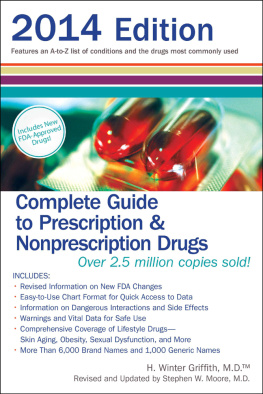
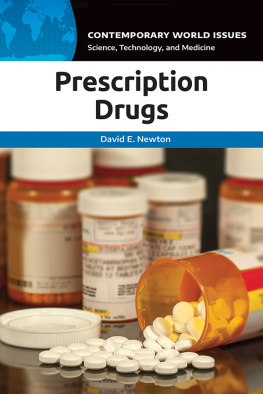
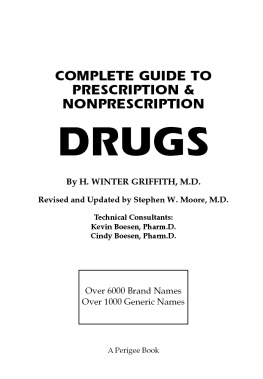

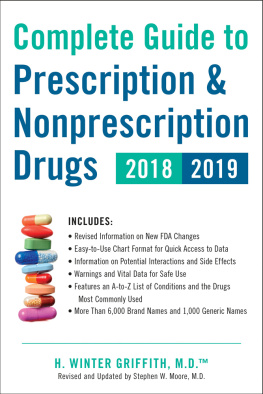
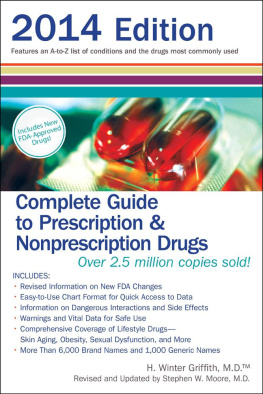
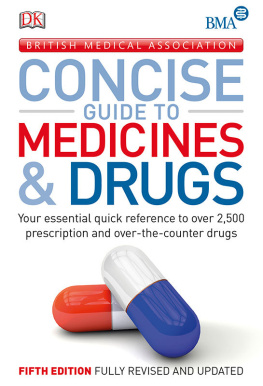

 USA | Canada | UK | Ireland | Australia | New Zealand | India | South Africa | China Penguin Books Ltd., Registered Offices: 80 Strand, London WC2R 0RL, England For more information about the Penguin Group, visit penguin.com.
USA | Canada | UK | Ireland | Australia | New Zealand | India | South Africa | China Penguin Books Ltd., Registered Offices: 80 Strand, London WC2R 0RL, England For more information about the Penguin Group, visit penguin.com. 